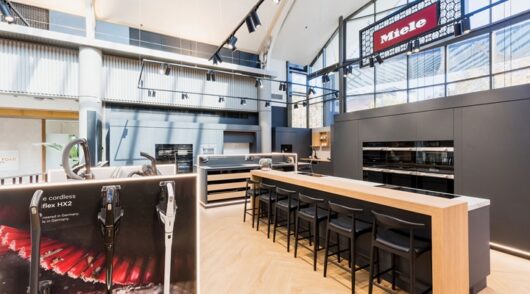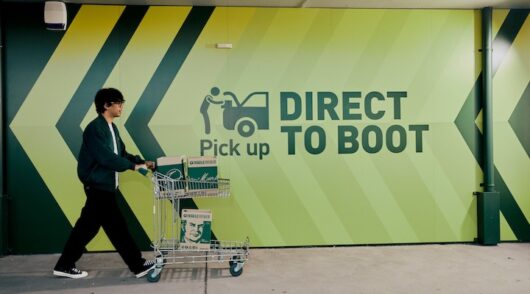As Australian retailers navigate rising costs, labour shortages, and increasing customer expectations, the pressure to maintain profitability and service levels has never been greater.
This article explores how smart supply chain solutions enable businesses to not only adapt but thrive in this new retail landscape.
Labour constraints and rising costs are reshaping retail operations
Retailers across Australia are contending with staffing shortages, rising wage demands, and the need to scale workforces for peak sales periods like Black Friday, Christmas, Boxing Day, and EOFY. This can lead to inconsistencies in fulfilment and customer experience.
Ferag’s smart automation solutions are designed to ease these pressures across both stores and distribution centres by reducing dependence on surge labour and reducing cost per carton.
- Store operations: Store labour tasks are minimised by reducing back-of-house processing. Ferag’s Skyfall pouch sorter can be pre-sorted at the distribution centre to align with store-specific requirements. When the truck arrives, stock is already sorted and ready to be moved directly onto the shop floor. This significantly reduces sorting, handling and preparation time in-store.
- Smart distribution centre operations: DoWarehouse software integrates demand forecasts from multiple sources to identify fast-moving products. These items are then pre-loaded into Skyfall for rapid access and efficient dispatch. This supports consistent and scalable throughput, removing the need for temporary labour during peak demand periods.
- Automation-led labour efficiency: Unlike conventional warehouse management systems, DoWarehouse full control of automation, down to the robotics layer. This improves overall equipment efficiency, reduces congestion and bottlenecks, improves inventory accuracy, and lowers labour costs through fewer manual tasks and reduced rework.
These efficiencies contribute to a lower cost per carton, helping improve service levels while supporting EBIT performance through better labour utilisation and throughput.
Inventory inaccuracies are draining revenue and impacting EBIT
Poor inventory visibility results in overstocking, delayed replenishment, stockouts, and lost sales, all of which directly impact profitability. These inefficiencies carry a measurable cost. A 2024 survey found that almost 40 per cent of Australian retailers are forced to cancel at least one in 10 customer orders due to inaccurate inventory data. Additionally, nearly six in 10 retailers report inventory accuracy below 80 per cent.
Ferag’s DoWarehouse platform, combined with automation, manages the entire putaway and picking processes. It delivers high levels of pick and stock accuracy, streamlines order processing, and supports reliable fulfilment. This reduces returns, builds customer trust, and improves forecasting. Enhanced inventory accuracy also leads to fewer markdowns, lower storage costs, and less waste, directly contributing to improved EBIT.
Shrinkage remains a significant issue, often exacerbated by limited visibility across the supply chain. Ferag’s automation systems improve inventory control by reducing manual handling and providing real-time, accurate visibility throughout warehouse and distribution operations.
DoWarehouse enables precise tracking of expected stock at each store, allowing businesses to identify and investigate shrinkage more effectively. Its available-to-promise functionality ensures system stock aligns with actual stock on hand, improving fulfilment reliability and customer confidence.
Fulfilment delays are costing customer loyalty
Speed and reliability are now baseline expectations for retail fulfilment. A 2023 survey found that 81 per cent of Australian consumers would not buy again after a poor delivery experience. This highlights the real cost of fulfilment inefficiencies. The April edition of Inside Retail explores how fulfilment performance can be a critical source of competitive advantage.
Ferag’s automated fulfilment systems increase the speed and accuracy of the pick-pack-dispatch cycle, improving service level agreement (SLA) performance and reducing order turnaround times. The DoWarehouse platform incorporates smart waving and smart sortation, boost fulfilment efficiency. It adapts dynamically to fluctuating order volumes, supporting both standard and priority fulfilment, while protecting profit margins.
Predictive processing is also key to improving customer satisfaction. By identifying high-demand items in advance and dispatching them quickly, retailers can minimise delays and exceed customer expectations. Ferag’s DoWarehouse software aggregates forecasts from multiple sources to identify these peak-demand products. Once these peak demand products are loaded into Skyfall they are automatically sorted for immediate fulfilment.
When demand is known in advance, such as a major product release, Skyfall can be preloaded with the anticipated high-volume items. As orders are placed, products are directed straight to packaging, bypassing multiple handling stages. Skyfall’s automatic loading and unloading capabilities further reduce manual intervention, cycle time, error rates, and the risk of shrinkage.
A leading retail brand’s e-commerce centre in the UK, has implemented Skyfall in a fully automated “one touch” e-commerce operation. This solution enables end-to-end fulfilment from pick to dispatch without any manual handling. Read more here
Conclusion
In a retail landscape shaped by rising costs, heightened customer expectations, and unpredictable demand, traditional fulfilment methods are no longer sufficient. The most resilient retailers are adopting smart intralogistics and automation to reduce operational costs, improve agility, and consistently meet service-level expectations.
By reducing the cost per carton across the supply chain, including labour, handling, storage, and freight, Ferag enables operational efficiency at scale. Faster fulfilment, higher throughput, improved equipment utilisation, and accurate inventory management contribute to increased revenue. At the same time, automation and structured processes improve safety and reduce dependence on temporary labour.
The result is a measurable improvement in EBIT performance, supported by smarter and more scalable supply chain operations.
- To learn how Ferag can help future-proof your retail operations, contact info-apac@ferag.com.






